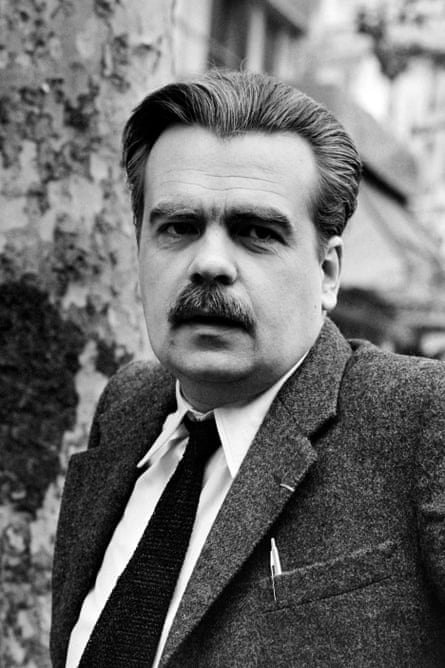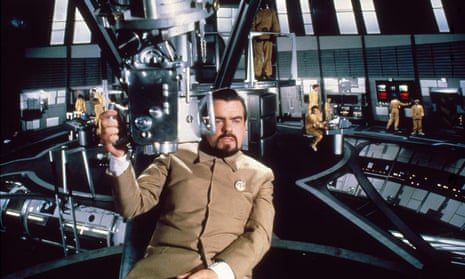Although he appeared in several English-language blockbusters, Michael Lonsdale, who has died aged 89, was an indispensable part of French cinema for well over half a century. He had roles in more than 180 films and television shows, in addition to working in the theatre. He won a César for his role in Des Hommes et Des Dieux (Of Gods and Men, 2010), as one of a group of Trappist monks living in rural Algeria. “I’d vowed never to accept another role as a priest,” Lonsdale said, “but I couldn’t resist playing this wonderful, generous character.”
It was Orson Welles who first cast Lonsdale as a priest, in The Trial (1962). “We only shot for one night, but he must have done 20 takes for my scene. Welles was incredibly nice and every few minutes, he would keep asking me: ‘Are you happy, Mr Lonsdale?’ Of course, I was thrilled.”
But Lonsdale’s real breakthrough came in 1968 in two François Truffaut films. In La Mariée Etait en Noir (The Bride Wore Black), he was a pompous politician, one of five men on whom Jeanne Moreau wreaks revenge for killing her husband on the church steps after their wedding. In Baisers Volés (Stolen Kisses), Lonsdale was the obnoxious owner of a shoe shop who hires a detective (Jean-Pierre Léaud) to work in his store to find out why his employees hate him.
Lonsdale’s dry delivery and his ability to get to the core of a character almost immediately suited the stylised characterisations and deconstructed narratives of Marguerite Duras. He first appeared under her direction in Détruire Dit-Elle (Destroy, She Said, 1969) as an enigmatic German Jew, one of the few guests at a hotel in a forest.
A few years later, Lonsdale was cast in Duras’ India Song (1975) as the lugubrious French vice-consul in the India of the 1930s who turns a blind eye to the numerous affairs engaged in by his pampered wife (Delphine Seyrig). “It’s my favourite role,” Lonsdale said. He also performed in and directed plays by Duras on the Paris stage and, among many others, by Samuel Beckett, another favourite writer.
In contrast, he gained wide international exposure in Fred Zinnemann’s The Day of the Jackal (1973), as the cool master policeman in charge of tracking down the lone would-be assassin (Edward Fox); and in Moonraker (1979), the 11th and most expensive of the James Bond films to date. Lonsdale portrayed Hugo Drax, the suave villain who plans to nerve-gas the world and rule over the community of genetically perfect astronauts with whom he will repopulate it. When 007 (Roger Moore) visits his castle, Drax says: “Look after Mr Bond. See that some harm comes to him.”
Lonsdale was born in Paris, to an English father, Edward Lonsdale-Crouch, an army officer, and a French-Irish mother, Simone Béraud, and spent much of his childhood in London and the Channel Islands. When Michael was eight, his family relocated to Casablanca in Morocco, where his father planned to set up a business.
“Then the war broke out and we were stuck in North Africa,” Lonsdale recalled. “It was there that my love for the cinema was born, thanks to the American soldiers who arrived in 1942. My parents became friends with the officers and they brought me along to see all the great movies by John Ford, George Cukor, Howard Hawks. I even saw Casablanca in Casablanca. It was amusing to see Hollywood’s idea of Morocco.”
In 1947, Lonsdale went to Paris to study painting, but soon decided to switch to acting to “overcome my shyness”. He took classes with Tania Balachova at the Vieux Colombier theatre, whose classes followed some of the Stanislavskian methods used by the Actors Studio in New York. Among his fellow students there were Seyrig, Laurent Terzieff, Stéphane Audran and Jean-Louis Trintignant. In his 2016 memoir Le Dictionnaire de Ma Vie, Lonsdale said he had fallen for Seyrig: “It was her or nothing, and that’s why at 85 I’m still unmarried.”

Around that time, he changed his first name to Michel, “Because the French had trouble pronouncing Michael” (though it reappeared on film credits), and converted to Catholicism.
After a number of bits in commercial French films, he started to get bigger parts in the early60s, mainly thanks to Jean-Pierre Mocky, who cast him in five features as an archetypal bourgeois, bringing out Lonsdale’s deadpan humour. The first, and most widely distributed abroad, was Snobs! (1962), an iconoclastic comedy in which Lonsdale played one of four unscrupulous directors of a milk co-operative vying to fill the post of president, after the incumbent is drowned in a vat of milk.
During the 70s, arguably the most fruitful decade of Lonsdale’s career, he was fortunate to work for some of the best directors around in a range of small but striking roles: he was a possibly paedophile priest in Louis Malle’s Le Souffle au Coeur (Murmurs of the Heart, 1971); a lustful theatre director in Jacques Rivette’s Out 1 (1974); a world-weary doctor in Alain Resnais’ Stavisky (1974) and, in Luis Buñuel’s Le Fantôme de la Liberté (The Phantom of Liberty, 1974), a “respectable” man who invites four monks to witness his being whipped.
Lonsdale was also seen in what could be called avant-garde erotica, playing a judge investigating a girl’s murder in Alain Robbe-Grillet’s Glissements Progressifs du Plaisir (Successive Slidings of Pleasure, 1974), and as a man who tells his friends a story about his early days as a Peeping Tom in Jean Eustache’s Une Sale Histoire (A Dirty Story, 1977). “I like to be where no one expects me to be,” Lonsdale explained.
He also made three films with Joseph Losey: Galileo (1975), based on the Brecht play, in which he played the intellectual Cardinal Barberini, who gradually discards his liberal views as he takes on the robes to become Pope Urban VIII; The Romantic Englishwoman (1975), which revealed him as a smooth gangster; and Mr Klein (1976), in which he was rather creepy as a cuckolded lawyer.
Lonsdale continued to appear in diverse films, including a few Hollywood movies, such as John Frankenheimer’s The Holcroft Covenant (1985), as the softly spoken Swiss accountant dealing with Michael Caine’s tainted inheritance, and Jean-Jacques Annaud’s The Name of the Rose (1986), in which he was the quizzical abbot who believes the devil is at work in his monastery.
Although the quantity of films he made was not reduced, the quality was. Among the exceptions were The Tribulations of Balthazar Kober (1988), the final film by the Polish director Wojciech Has, in which Lonsdale played a wise philosopher; and two James Ivory films, The Remains of the Day (1993), as a French statesman with blisters on his feet, and Jefferson in Paris (1995), as Louis XVI.
He was back to priestly robes as the Inquisitor General in Miloš Forman’s period soap opera Goya’s Ghosts (2006), and in Nicolas Klotz’s Heartbeat Detector (2007) he was the chief executive of a large company who locks himself away in his office for hours on end and sits alone listening to Schubert in the back seat of his parked car.
In the latter part of his career, the grey-bearded Lonsdale lent gravitas to whatever part he played, including Theon, the head of the library in Alexandria, in Agora (2009), directed by Alejandro Amenábar, the leader of a mosque in occupied Paris in Ismaël Ferroukhi’s Free Men (2011), and the title role of Manoel de Oliveira’s O Gebo e a Sombra (Gebo and the Shadow, 2012).
Michael Lonsdale (Michael Edward Lonsdale-Crouch), actor, born 24 May 1931; died 21 September 2020

Comments (…)
Sign in or create your Guardian account to join the discussion